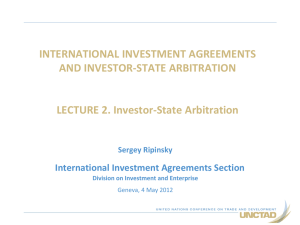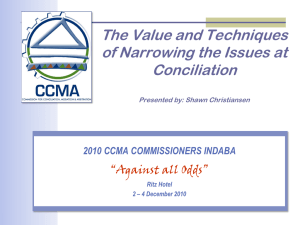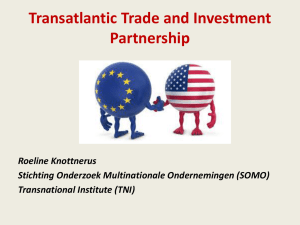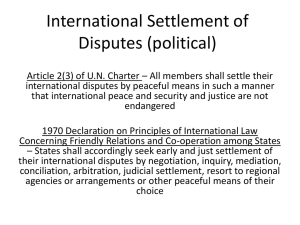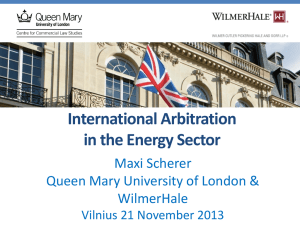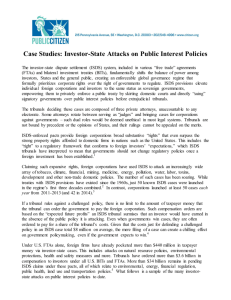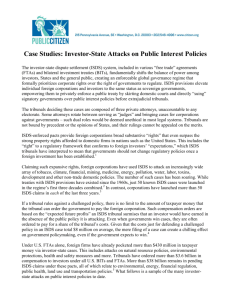LL.M. - IILJ
advertisement
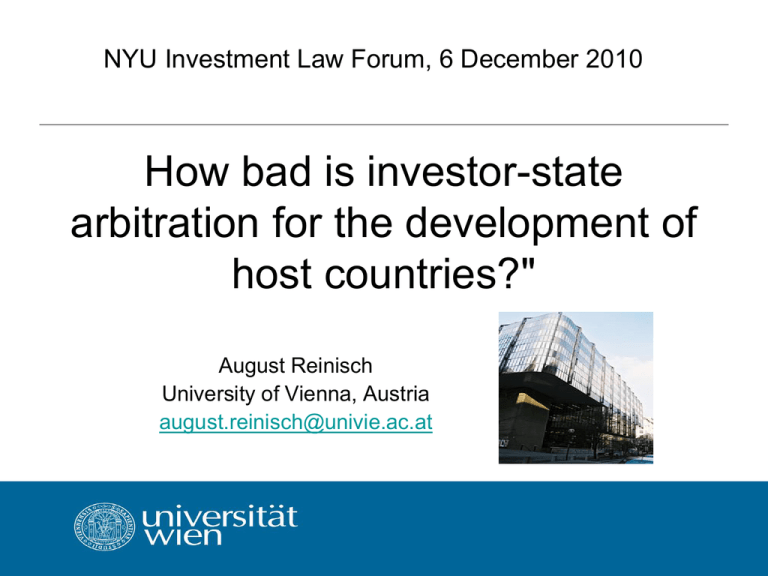
NYU Investment Law Forum, 6 December 2010 How bad is investor-state arbitration for the development of host countries?" August Reinisch University of Vienna, Austria august.reinisch@univie.ac.at LL.M. IN INTERNATIONAL LEGAL STUDIES A backlash against investor-State arbitration? • The problem of inconsistent or even contradictory awards – Lack of predictability • Lack of transparency – Voice of public interests • High costs – Damages and proceedings • Loss of sovereignty – Chilling effect on regulatory autonomy LL.M. IN INTERNATIONAL LEGAL STUDIES Inconsistent or contradictory awards • Lauder v. The Czech Republic (UNCITRAL), Final Award (Sept. 3, 2001), and CME Czech Republic B.V. v. The Czech Republic (UNCITRAL), Partial Award (Sept. 13, 2001), • SGS Société Générale de Surveillance S.A. v. Islamic Republic of Pakistan, Decision on Jurisdiction (Aug. 6, 2003), and SGS Société Générale de Surveillance S.A. v. Republic of the Philippines, ICSID Case No. ARB/02/6, Decision on Jurisdiction (Jan. 29, 2004), • CMS Gas Transmission Co. v. The Argentine Republic, ICSID Case No. ARB/01/8, Award, paras. 320–321 (May 12, 2005), and LG&E Energy Corp., LG&E Capital Corp. and LG&E Int’l Inc. v. Argentine Republic, ICSID Case No. ARB/02/1, Decision on Liability, para. 257 (Oct. 3, 2006). LL.M. IN INTERNATIONAL LEGAL STUDIES The problem of inconsistent or even contradictory awards • Principled response: – Appellate mechanism for investment arbitration • Pragmatic response: – Consolidation of proceedings – Development of a jurisprudence constante or de facto case law LL.M. IN INTERNATIONAL LEGAL STUDIES Inconsistent awards and lack of transparency • Problem is exacerbated by confidentiality • NGO criticism: lack of transparency of investorState proceedings • Commercial arbitration heritage, but important reforms: ICSID, current UNCITRAL debate • Response: Trend towards publication of awards plus partly pleadings LL.M. IN INTERNATIONAL LEGAL STUDIES Public criticism • “Their meetings are secret. Their members are generally unknown. The decisions they reach need not be fully disclosed. Yet the way a small group of international tribunals handles disputes between investors and foreign governments has led to national laws being revoked, justice systems questioned and environmental regulations challenged. And it is all in the name of protecting the rights of foreign investors under the North American Free Trade Agreement.” • “NAFTA’s Powerful Little Secret; Obscure Tribunals Settle Disputes, but Go Too Far, Critics Say,” N.Y. Times (Mar. 11, 2001). LL.M. IN INTERNATIONAL LEGAL STUDIES Transparency • “Nothing in the NAFTA imposes a general duty of confidentiality on the disputing parties to a Chapter Eleven arbitration, and, … precludes the Parties from providing public access to documents submitted to, or issued by, a Chapter Eleven tribunal.” • NAFTA Free Trade Comm’n, Notes of Interpretation of Certain Chapter 11 Provisions, para. A(1) (July 31, 2001). LL.M. IN INTERNATIONAL LEGAL STUDIES Transparency • Amicus curiae – e.g., Suez, Sociedad General de Aguas de Barcelona, S.A. and Vivendi Universal, S.A. v. Argentine Republic, ICSID Case No. ARB/03/19, Order in Response to a Petition for Transparency and Participation as Amicus Curiae (May 19, 2005) • Amendments to the ICSID Rules and Regulations and the Additional Facility Rules (effective Apr. 10, 2006): – public availability of its awards unless objected to, but also with regard to public or semi-public hearings, the permission of amicus curiae briefs, etc. LL.M. IN INTERNATIONAL LEGAL STUDIES Financial Risks • Extremely large awards – CME v. Czech Republic Final Award, (UNCITRAL), Partial Award (Sept. 13, 2001), Final Award (Mar. 14, 2003) – Československa obchodní Banka, a.s. v. The Slovak Republic, ICSID Case No. ARB/97/4, Final Award (Dec. 29, 2004). LL.M. IN INTERNATIONAL LEGAL STUDIES Financial Risks • High costs of proceedings “Contrary to the expectations, it turns out that costs involved in investor–State arbitration have skyrocketed in recent years. This refers not only to the damages States must pay to foreign investors in the case of a violation of a treaty provision, but the costs for conducting arbitration procedures are extremely high, with legal fees amounting to an average of 60 per cent of the total costs of the case.” UNCTAD, Investor–State Disputes: Prevention and Alternatives to Arbitration (2010), 16/17 • Advisory/Assistance Center for Developing Countries LL.M. IN INTERNATIONAL LEGAL STUDIES Financial Risks • The Financial Times recently referred to a series of awards involving: (1) “hundreds of millions of dollars in compensation,” (2) a claim by Mobil for “billions of dollars,” and (3) Bolivia’s “loss” in a case against Bechtel. • Alan Beattie, Concern Grows over Global Trade Regulation, Financial Times, Mar. 12, 2008, at 9. LL.M. IN INTERNATIONAL LEGAL STUDIES Financial Risks • “Empirical information aids the assessment of such claims. It aids their contextualization to know: (1) the average value of awards is in the order of US$10 million, which suggests a US$140 million award is a statistical outlier, (2) the difference between amounts claimed and awarded has been in the order of US$333 million, and (3) Bolivia’s “loss” at the jurisdictional phase, where most governments lose as the case proceeds to the merits phase, actually resulted in a settlement where the investors dropped their claims and were paid nothing.” • Susan D. Franck, Empiricism and International Law: Insights for Investment Treaty Dispute Resolution,48 VaJIL 767, 799 (2008) LL.M. IN INTERNATIONAL LEGAL STUDIES Loss of control over dispute settlement • Private investors decide over the initiation of proceedings • In treaty arbitration no obvious reciprocity; states can usually only raise counterclaims • States may wish to regain control – See e.g. Australia-U.S. FTA (2004), most EC FTAs contain no investor-State DS LL.M. IN INTERNATIONAL LEGAL STUDIES Loss of control over dispute settlement • A new preference for inter-state dispute settlement? • Rise of FTAs and PTAs with investment chapters without investor-State arbitration • Investment pre-negotiations in the WTO (Singapore issues) focused on inter-state dispute settlement • Uncertain views of the EU Commission on investor-State arbitration after gaining control over investment treaty-making powers through the Lisbon Treaty LL.M. IN INTERNATIONAL LEGAL STUDIES The EU and investor-State arbitration • “Investor-state dispute settlement, which forms a key part of the inheritance that the Union receives from Member State BITs, is important as an investment involves the establishment of a long-term relationship with the host state which cannot be easily diverted to another market in the event of a problem with the investment. Investor-state is such an established feature of investment agreements that its absence would in fact discourage investors and make a host economy less attractive than others. For these reasons, future EU agreements including investment protection should include investor-state dispute settlement.” • Commission Communication, Towards a comprehensive European international investment policy, COM(2010)343 final, 9/10 LL.M. IN INTERNATIONAL LEGAL STUDIES Loss of control over dispute settlement • De-politicization of investment disputes – Inter-State level creates political costs, modern gun-boat politics • Investor-State arbitration avoids diplomatic protection – rids host States of harassment value of diplomatic protection LL.M. IN INTERNATIONAL LEGAL STUDIES Avoidance of diplomatic protection • “No Contracting State shall give diplomatic protection, or bring an international claim, in respect of a dispute which one of its nationals and another Contracting State shall have consented to submit or shall have submitted to arbitration under this Convention, unless such other Contracting State shall have failed to abide by and comply with the award rendered in such dispute.” • Article 27 ICSID Convention LL.M. IN INTERNATIONAL LEGAL STUDIES Effective investment protection • “From the point of view of the promotion and protection of investments, the arbitration clause is in practice the most essential provision of Bilateral Investment Treaties.” • Eastern Sugar BV v. Czech Republic (UNCITRAL), SCC Case No. 088/2004, Partial Award and Partial Dissenting Opinion, para. 165 (Mar. 27, 2007) LL.M. IN INTERNATIONAL LEGAL STUDIES Loss of sovereignty/chilling effect on regulation • “Concerns have been raised, particularly in the wake of several controversial investor-state disputes, that in some instances the protection offered to investors may limit the ability of governments to regulate investment for the protection of the environment, natural resources and other social goods, and to ensure that foreign investment contributes to overall national development goals. Some authors have also suggested that the threat of an investorstate dispute could have a chilling effect on government policy, though they note that there is little evidence to substantiate such a claim.” • Tienhaara, What You Don’t Know Can Hurt You: Investor-State Disputes and the Protection of the Environment in Developing Countries, Global Environmental Politics 6:4, November 2006, 73-100, 75. LL.M. IN INTERNATIONAL LEGAL STUDIES Loss of sovereignty/chilling effect • “The increase in North American Free Trade Agreement (NAFTA) cases against the United States, Mexico and Canada have also triggered fears about frivolous and vexatious claims that could inhibit legitimate regulatory action by governments.” • UNCTAD, Investor–State Disputes: Prevention and Alternatives to Arbitration (2010), 19. LL.M. IN INTERNATIONAL LEGAL STUDIES Loss of sovereignty/chilling effect • “[T]his concern about regulatory chill does not appear to have been justified. To date the majority of cases related to regulatory policy have either been dismissed or decided in favour of the host Government and where decisions have been in favour of the investor, awards have been relatively small.” • EP, The EU Approach to International Investment Policy After the Lisbon Treaty (2010), p. 46. LL.M. IN INTERNATIONAL LEGAL STUDIES “Good governance” effect • The potential financial liability under investor-State arbitration may effectively lead to compliance with investment standards; • Rule of law-inspired limits on the regulatory powers of host States; • May complement “good governance” aims LL.M. IN INTERNATIONAL LEGAL STUDIES “Good governance” at the international level • “Good governance promotes equity, participation, pluralism, transparency, accountability and the rule of law, in a manner that is effective, efficient and enduring.” • http://www.un.org/en/globalissues/governance/. LL.M. IN INTERNATIONAL LEGAL STUDIES The rule of law • “The “rule of law” is a concept at the very heart of the Organization’s mission. It refers to a principle of governance in which all persons, institutions and entities, public and private, including the State itself, are accountable to laws that are publicly promulgated, equally enforced and independently adjudicated, and which are consistent with international human rights norms and standards. It requires, as well, measures to ensure adherence to the principles of supremacy of law, equality before the law, accountability to the law, fairness in the application of the law, separation of powers, participation in decision-making, legal certainty, avoidance of arbitrariness and procedural and legal transparency.” • ‘The rule of law and transitional justice in conflict and post-conflict societies’, Report of the Secretary-General, S/2004/616, 23 August 2004, para. 6. LL.M. IN INTERNATIONAL LEGAL STUDIES The rule of law • “(a) there is a set of rules known in advance, (b) the rules are actually in force, (c) there are mechanisms ensuring application of the rules, (d) conflicts are resolved through binding decisions of an independent judicial body, and (e) there are procedures for amending the rules when they no longer serve their purpose.” • World Bank, Governance and Development, 30 (1992). LL.M. IN INTERNATIONAL LEGAL STUDIES The link between the rule of law and economic development • “[The] connection of the rule of law with efficient use of resources and productive investment, which must be understood and dealt with in highly specific and differentiated cultural and political settings, is the aspect most important to economic development, and hence to World Bank assistance.” • World Bank, Governance and Development, 30 (1992). LL.M. IN INTERNATIONAL LEGAL STUDIES The rule of law and fair and equitable treatment • “‘[F]air and equitable treatment’ includes the obligation not to deny justice in criminal, civil, or administrative adjudicatory proceedings in accordance with the principle of due process embodied in the principal legal systems of the world;” • Article 5(2)(a) US Model BIT 2004. LL.M. IN INTERNATIONAL LEGAL STUDIES Fair and equitable treatment • “The [host state], without undermining its legitimate right to take measures for the protection of the public interest, has therefore assumed an obligation to treat a foreign investor’s investment in a way that does not frustrate the investor’s underlying legitimate and reasonable expectations. A foreign investor […] is entitled to expect that the [host state] will not act in a way that is manifestly inconsistent, nontransparent, unreasonable (i.e. unrelated to some rational policy), or discriminatory (i.e. based on unjustifiable distinctions). In applying this standard, the Tribunal will have due regard to all relevant circumstances.” • Saluka Investments BV (The Netherlands) v The Czech Republic, Partial Award, 17 March 2006, para. 309. LL.M. IN INTERNATIONAL LEGAL STUDIES External rule of law and its relation to domestic dispute settlement • Unclear relationship between investorState arbitration and domestic courts: – Spill-over effect or – Circumvention of national procedures LL.M. IN INTERNATIONAL LEGAL STUDIES Circumvention of national procedures • “The decision to bypass domestic courts may reduce courts’ incentives to improve performance by depriving key actors from a need to invest in institutional improvement. It allows the government to segment its reputation among domestic and foreign actors.” • T. Ginsburg, International Substitutes for Domestic Institutions: Bilateral Investment Treaties and Governance, 25 International Review of Law and Economics (2005) 107, 119. LL.M. IN INTERNATIONAL LEGAL STUDIES Spill-over effect • “[…] one might imagine that there is a form of regulatory competition among institutions. International arbitration, for example, can spur domestic courts to compete for the business of resolving commercial disputes and thus improve their quality. BITs can also serve as a signal to domestic audiences that the government does not plan to expropriate, will adopt relatively stable policies, and will not treat local actors with special favor.” • Ginsburg, International Substitutes, 25 International Review of Law and Economics (2005) 107, 119. LL.M. IN INTERNATIONAL LEGAL STUDIES

